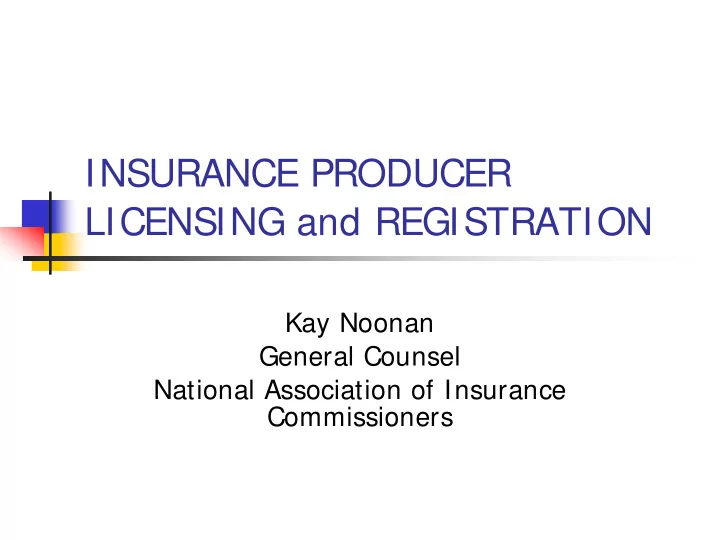

INSURANCE PRODUCER LICENSING and REGISTRATION Kay Noonan General Counsel National Association of Insurance Commissioners
Who is the NAIC? � The National Association of Insurance Commissioners (NAIC) is the organization of insurance regulators from the 50 states, the District of Columbia and the five U.S. territories.
What does the NAIC do? � The mission of the NAIC is to assist state insurance regulators, individually and collectively, in serving the public interest and achieving the following fundamental insurance regulatory goals in a responsive, efficient and cost effective manner, consistent with the wishes of its members: � Protect the public interest; � Promote competitive markets; � Facilitate the fair and equitable treatment of insurance consumers; � Promote the reliability, solvency and financial solidity of insurance institutions; and � Support and improve state regulation of insurance.
What does the NAIC do? � Provide our members with a forum for discussing issues of common concern and developing uniform policy where uniformity is appropriate � Develop model laws, regulations, and guidelines � Publish financial and accounting standards, white papers, consumer guides, and handbooks for regulator use
State Insurance Regulation Legal Framework � U.S. Supreme Court recognized the state system of insurance regulation in Paul v. Virginia, decided in 1869. � In U.S. v. Southeastern Underwriters Association , decided in 1944, the Court revisited the issue and held that the business of insurance was in fact interstate commerce.
State Insurance Regulation Legal Framework � The McCarran Ferguson Act (1945), enacted in response to the South- Eastern Underwriters case, permits the states to act as the primary regulatory authority over the business of insurance, including the regulation or those who sell insurance.
State Insurance Regulation Legal Framework � The Gramm Leach Bliley Act (GLBA), enacted in 1999, affirms McCarran Ferguson and the primacy of state regulation of insurance. � Establishes the concept of functional regulation over financial services entities and removes the barriers between the types of products offered by each.
State Insurance Regulation Legal Framework � GLBA also established certain reciprocity and uniformity requirements that needed to be met by a majority of the states in order to avoid the preemption of state producer licensing laws. � “Reciprocity” means that when licensing nonresident individuals and entities, the states largely defer to the home State’s requirements.
Insurance Producer Licensing � Individuals or entities who sell, solicit or negotiate insurance (called insurance producers) are required to be licensed in the state where they are acting. � Insurance producer licenses are awarded on both a resident and non- resident basis.
Insurance Producer Licensing � Under the GLBA reciprocity requirements, a nonresident individual or entity should not be required to do anything but: � Complete the application � Pay the fee � For business entities, the producer trade associations challenge a foreign corporation registration requirement as a violation of reciprocity.
Secretary of State Registration � NAIC member survey � 25 states responded that they required verification of SOS registration as a prerequisite to issuance of an insurance license. � Of those states that identified the requirement as one of statute, the statute is in general corporate law, not part of the insurance code.
Secretary of State Registration � Many of our members have eliminated the prerequisite as a matter of process, or are pursuing the necessary statutory and/or regulatory changes. � In those states, our members have worked with their respective Secretary of State to allow for electronic verification of status or other method of communication.
Industry Position � Some representatives of the insurance producer trade groups argue that corporate registration is not required at all because non-resident business entity insurance producers are not doing business in the non-resident state.
Industry Position � Some representatives of the insurance producer trade groups argue that corporate registration should not be required because of the extensive regulation by insurance departments that the entities are subject to. � This includes designation of the insurance department as agent for service of process.
HR 5611 � Introduced in March with broad bipartisan support. � Establishes a federal entity for insurance producer licensing. � Would prohibit states from requiring non-resident insurance producers to register as foreign corporations.
QUESTIONS? � If you have questions about how the issue is handled in your state, get in touch with your state Insurance Commissioner, Director or Superintendent.
Recommend
More recommend